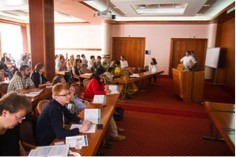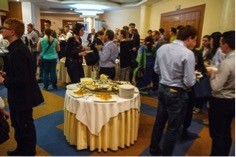Intenso - Gaining Productivity, Cost Efficiency and Sustainability in the Downstream Processing of Bio Products by Novel Integration and Intensification Strategies.
News & Events
Latest News and Events
With interesting lectures, dynamic discussions and interactive workshops Monolith Summer School and Symposium 2016 confirmed its position as a must-attend event in the Bioprocessing calendar. It is every second year, when opinion leaders and influencers meet to discuss new, cutting edge applications and breakthroughs.
From the basic theoretical knowledge to the advanced applications on virus, protein, vesicle and nucleic acid purification the conference presented fresh insight into the biologicals purification. It is the presented novelties that will lead the way to a more robust, economically efficient and regulatory compliant downstream processes.
Organizationally, the event was divided in to the Summer School and the Symposium. The Summer School took place on Saturday and Sunday (28th and 29th of May 2016). It was divided in to the theoretical and practical part.
 As part of the Intenso project Dr. Urh Černigoj presented a lecture on Saturday entitled: “pDNA purification – general aspects“, where fundamentals as well as novel achievements in plasmid DNA (pDNA) downstream processing using Convective Flow Systems were discussed. The focus was especially on intensification of pDNA purification by combining clarification and capture steps into a single step using BiAxcys module – a product developed by combined knowledge and expertise from different members of Intenso consortium.
As part of the Intenso project Dr. Urh Černigoj presented a lecture on Saturday entitled: “pDNA purification – general aspects“, where fundamentals as well as novel achievements in plasmid DNA (pDNA) downstream processing using Convective Flow Systems were discussed. The focus was especially on intensification of pDNA purification by combining clarification and capture steps into a single step using BiAxcys module – a product developed by combined knowledge and expertise from different members of Intenso consortium.
The second disseminated improvement of pDNA downstream process on monoliths developed within Intenso project was application of sample displacement chromatography in pDNA polishing step. On Sunday Dr. Urh Černigoj together with Viktor Zalokar carried out workshop entitled “Method development – how to design methods and transfer them to large scale”. Within the workshop demonstrators presented the prototype BiAxcys module in action – the chromatographic capture of pDNA from crude lysate.
Novel fundamental knowledge with cutting edge application’s was presented and discussed during three day Symposium (30t of May 2016 to 1st of June 2016). The Symposium was divided in-to 7 thematic sections as listed below:
- THEORETICAL ASPECTS AND CHARACTERISATION OF MONOLITHS
- ANALYTICS
- PROCESS ANALYTICAL TECHNOLOGY
- VIRUS PURIFICATION
- PROTEIN PURIFICATION
- NUCLEIC ACID PURIFICATION
 Dr. Petra Steppert as part of Intenso project held a lecture on the topic of High resolution separation of virus-like particles and variants on monoliths in which she presented newly developed separation process. The process allows purification of at least 250 doses of HIV VLP or MLV VIPs in 2 hours with 1 ml column by anion exchange or hydrophobic interaction chromatography. It has been noted that in linear as well as in step-wise elution VLPs elute over the wide range within the gradient. They showed with laser light scattering and TEM that the VLP proteins were of the same size and on the other hand very heterogeneous in composition, as proven with proteomic analysis. The heterogeneous elution was connected to the differences in VLPs itself. Dr Steppert concluded that the developed process is appropriate for large scale production of mentioned VLPs.
Dr. Petra Steppert as part of Intenso project held a lecture on the topic of High resolution separation of virus-like particles and variants on monoliths in which she presented newly developed separation process. The process allows purification of at least 250 doses of HIV VLP or MLV VIPs in 2 hours with 1 ml column by anion exchange or hydrophobic interaction chromatography. It has been noted that in linear as well as in step-wise elution VLPs elute over the wide range within the gradient. They showed with laser light scattering and TEM that the VLP proteins were of the same size and on the other hand very heterogeneous in composition, as proven with proteomic analysis. The heterogeneous elution was connected to the differences in VLPs itself. Dr Steppert concluded that the developed process is appropriate for large scale production of mentioned VLPs.
Hana Jug and Dr. Tina Simčič presented a poster titled Optimization of pDNA Downstream Bioprocessing Using Hydrophobic Chromatographic Monoliths in Sample Displacement Mode. They developed a method for pDNA isoforms separation based on the capture step using CIMmultus DEAE column and polishing step on C4 HLD column. The latter was optimized for high separation efficiency and the data was processed for comparison of the productivities of supercoiled pDNA isolation.
Intenso Project
The Intenso project is a diverse consortium of 16 partners, consisting of 5 universities and 11 companies, who are leaders in their respective fields of bio-separation technologies. Funded under the EU-FP7 framework since 2012, the consortium's efforts are focussed on increasing productivity, cost efficiency, and sustainability in the downstream bioprocessing of mAbs, VLPs, pDNA, and various proteins. The project is built upon 4 state-of-the-art scientific pillars, which are aimed at integrating multiple separation steps while increasing separation efficiency.
Supported By

